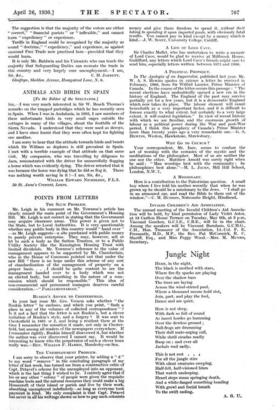POINTS FROM LETTERS
THE SLUM PROBLEM.
Mr. Leigh in his comment on Mr. Townroe's article has clearly missed the main point of the Government's Housing Bill. Mr. Leigh is not correct in stating that the Government may acquire clearance areas. This power is given not to the State, but to Local Authorities. It is very questionable whether any public body in this country would hand over " —as Mr. Leigh suggests--a site purchased with public money to purely private enterprise. They may, however, sell or let to such a body as the Sutton Trustees, or to a Public Utility Society like the Kensington Housing Trust with limited dividends. Mr. Townroe's reference to the Value of management appears to be supported by Mr. Chamberlain, who in the House of Commons pointed out that under the new Bill " there is no hope under this scheme of any sort of standardization of the management of property on a proper basis. . . I should be quite content to see the management handed over to a body which was not an elected body, but something in the nature of a com- mission which should be responsible." This idea of non-commercial and permanent managers deserves careful consideration.—" PARLIAMENTARIAN."
RUSKIN'S ADVICE TO CHESTERFIELD.
In your last issue Mr. Geo. Vernon asks whether " the Ruskin letter " he encloses, and which you print, " finds a place in any of the volumes -of collected correspondence " ? Is it not a fact that the letter is not Ruskin's, but a clever imitation of Ruskin's style, and a forgery ? It was sent to Chesterfield in 1881 or 2, and being a resident there at the time I remember the sensation it made, not only in Chester- field, but among all readers of the newspapers everywhere. If I remember rightly, Ruskin himself disavowed it, but whether the author was ever discovered I cannot say. It would be interesting to know *ho theperpetrator of such a clever hoax really was.—REV. WILLIAM F. HARRIS, Mundesley-on-Sea.
THE UNEMPLOYMENT PROBLEM.
I am sorry to observe that your printer, by adding a " d " to my word "remove " in the concluding paragraph of my letter of last week, has turned me from a constructive critic of Capt. Petavel's scheme for the unemployed into an opponent, which is the last thing I wished to be. I entirely agree that if his or any other " colony " of people were given the requisite machine tools and the natural resources they could make a big Homecroft of their island or parish and live by their work, absorbing unemployed indefinitely—so long as everyone took payment in kind. My only complaint is that Capt. Petavel has never in all his writings shown us how to pay such colonists money and give them freedom to spend it, without their taking to spending it upon imported goods, with obviously fatal results. You cannot pay in kind except by a money which is kind.—J. W. Scurr, University College, Cardiff.
A LIFE OF Loan CAVE.
Sir Charles Mallet, who has undertaken to write a memoir of Lord Cave, would be glad to receive at Millbrook House, Guildford, any letters which Lord Cave's friends might care to send him, especially letters written between 1875 and 1906.
A POLITICAL PROPHECY.
In The Apologia of an Imperialist, published last year, Mr. W. A. S. Hewins quotes in extenso a letter he received in February, 1906, from Sir Wilfrid Laurier, Prime Minister of Canada. In the course of the letter occurs this passage : " The recent elections have undoubtedly opened a new era in the history of England. The England of the past may survive partially yet for a few years, but it is a democratic England which now takes its place. The labour element will count henceforth as a very important factor, and it is difficult to foresee exactly to what extent, but certainly to a very large extent, it will control legislation." In view of recent history with which we are familiar, and the enormous growth of labour as a political power during the War and post-War period, I think this prophecy of Canada's Prime Minister more than twenty years ago a very remarkable one.—G. S. HEwrNs, Weston, Hawkstone, Shrewsbury.
WHY Go TO CHURCH ?
Your correspondent, Mr. Ince, seems to confuse the act of worship with the ecstasies of the mystic and the meditations of the philosopher. Most of us are neither the one nor the other. Matthew Arnold was surely right when he said : " Man worships best with the community; philosophizes best alone. —M. L. Jacirs, Mill Hill Scool, London, N.W. 7.
A MISSIONARY.
Here is a contribution to the Palestinian question. A small boy where I live told his mother recently that when he was grown up he should be a missionary to the Jews. " I shall go in an armoured car, and read the Bible to them out of the window."—C. M. HUDSON, Nutcombe Height, Hindhead.
INVALID CHILDREN'S Am ASSOCIATION.
The annual meeting of the Invalid Children's Aid Associa- tion will be held, by kind permission of Lady Violet Astor, at 18 Carlton House Terrace on Tuesday, May 6th, at 8 p.m. Viscount Goschen, G.C.I.E., C.B.E., will be in the chair. Among the speakers will be Viscount. Burnham, G.C.M.G., C.H., Hon. Treasurer of the Association, Lt.-Col. F. E. Fremantle, M.D., M.P., the Rev. Pat McCormick, R. C. Sheriff, Esq., and Miss Peggy Wood.—MRS. M. MUNRO, Secretary,




































 Previous page
Previous page